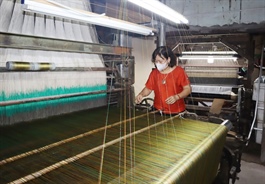Textile and garment industry awaiting fresh drive in order to reverse fortunes
Textile and garment industry awaiting fresh drive in order to reverse fortunes
Despite its continued reliance on traditional markets, the garments and textiles industry in Vietnam is gaining momentum for a gradual recovery in 2024 due to the diversification of its consumer base, products, and markets.

The country’s textile and garment exports in 2023 are estimated to fall 9.2 per cent to reach $40.3 billion, but the consumer base and markets are becoming more diverse, which bodes well for the future.
The industry witnessed significant growth in terms of both products and markets in the last 12 months. Exports of various types of 36 items and products reached 104 markets across countries and territories. The decline in exports notwithstanding, there are positives in terms of the way the industry is evolving.
Vu Duc Giang, chairman of the Vietnam Textile and Apparel Association (Vitas), stated on December 16 that the structure of export products has changed significantly this year, with workwear, suits, medical attire, and jeans experiencing a sharp increase, while flannels, shorts, and children’s clothing, previously the primary export items, decreased dramatically.
“Expanding markets, products, and customers is an avenue for Vietnam’s garments and textiles industry in terms of decreasing dependence on large markets,” Giang said.
As significant export markets experienced stagnation and a decline in orders, companies sought out new markets, including the African market featuring product lines tailored for Muslim countries, as well as Russia and Bangladesh, which were previously overlooked.
For example, Dai Viet produces Muslim clothing for the Middle East, where boys wear Thoub shirts when they turn two years old. “We mainly export Thoub shirts to the Saudi Arabian market,” said Diep Thanh Kiet, chairman of Dai Viet.
TNG, a Vietnamese garments and textiles company, achieved its revenue target of $2.8 million for 2023. The business continues to sustain output by accepting orders with low profit margins, which contributes to the company’s stable export orders. However, TNG’s gross profit margin for the initial half of 2023 remains below the industry average, persisting until mid-December 2023.
TNG’s counterparties are submitting new orders at a comparatively sluggish rate in comparison to 2022. Until last August, TNG had only obtained orders through the end of October. However, they did not negotiate orders for the fourth quarter of 2023.
In a report released at the end of August, SSI Research predicted that the results of the textile industry in the second half of 2023 would be equal to the first half of the year. It estimated the number of orders for the textile industry was likely to increase gradually starting from the fourth quarter of 2023. The business results of the textile industry in 2023 are close to SSI Research’s forecast.
Nonetheless, SSI has predicted that the retail price of exported apparel will remain low, improving only marginally for free on board orders and remaining roughly 20 per cent below the average for the first half of 2022. Consequently, despite the gradual improvement in input material costs, manufacturing enterprises will continue to experience narrowing profit margins, and it will be challenging for the gross profit margin to regain its peak level of 2019.
However, more positive signals have emerged. Vinatex stated in a report published on October 30 that the market is now poised for a gradual but steady recovery, as the most challenging period has passed. The World Trade Organization has projected that merchandise trade will increase by 3.3 per cent in 2024, which is four times the growth rate in 2023.
Vinatex has reported that in 2024, the key principle of Vietnam’s textile and garment industry will be the promotion of exports to the US market. Vietnam’s main export market for textiles has been the US for many years, accounting for 40-45 per cent of the country’s global textile export market. The expansion of growth momentum in this market is anticipated in the near future after Vietnam and the US elevated their relationship to that of a comprehensive strategic partnership in September.
Despite anticipating a 5-7 per cent decrease in total demand in 2024 compared to 2022, Cao Huu Hieu, general director of Vinatex, remarked that the market is undergoing a positive shift.
“Market demand in 2024 is expected to exceed that of 2023. The US and Chinese markets are exhibiting signs of recovery. In the latter half of 2023, their respective purchasing managers’ indexes were more than 50 points, exceeding the levels anticipated in early 2023,” Hieu said.
The Vitas has projected that the textile industry will achieve its $44 billion export target in 2024.
























